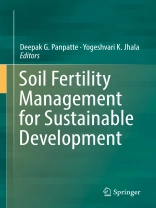Soil fertility is the backbone of agricultural systems and plays a key role in determining food quantity and quality. In recent decades, soil fertility has decreased due to indiscriminate use of agrochemicals, and nations around the globe are now facing the challenge of increasing food production while sustainably maintaining soil fertility. Written by leading international scientists in the field, this book explores soil fertility management strategies, including agronomic, microbiological and soil-science based strategies. Highlighting the practices that can be incorporated into organic farming and discussing recent advances, it is a valuable resource for researchers wanting to broaden their vision and the scope of their investigations.
Inhaltsverzeichnis
Chapter 1: An Insight into Mycorrhiza Involved in Building Soil Health (Swami).- Chapter 2: Integrated Soil Fertility Management (Yadav).- Chapter 3: Mulching: An option to Improve Sustainable Soil Health (Gopalakrishnan).- Chapter 4: Biofertilizers.- Chapter 5: Microbiome of rhizospheric soil and vermicompost and their applications in soil fertility, pest and pathogen management for sustainable agriculture (Sakthivel).- Chapter 6: Sustainable soil management options to cope with the impact of changing climate (Chauhan).- Chapter7: Prospects of organic farming as cost effective approach in modern agriculture (Soni).- Chapter 8: Carbon sequestration for soil fertility management: Microbiological perspective (Waghunde).- Chapter 9: Potential Application of Sea Weed as Biofertilizer in Agriculture (Raghunandan).- Chapter 10: Soil fertility improvement by inoculation of symbiotic rhizobia in legumes for sustainable agriculture (Sindhu).- Chapter 11: Biocomposting: A viable tool towards soil fertility management (Mikunthan).- Chapter 12: Site Specific Nutrient Management through nutrient decision support tool for sustainable crop production and soil health (Pratap Singh).- Chapter 13: Biochar (Sheshadri).- Chapter 14: Phosphate rich organic manure (PROM)-Mycorhizae for soil fertility management (Dessai).- Chapter 15: Soil quality status in different region of Nepal (Anup).- Chapter 16: Soil fertility management in organic farming system (Panpatte).- Chapter 17: Recycling of organic waste for soil fertility management (Jhala).
Über den Autor
Dr. Deepak G. Panpatte has been working as a research scholar for the past 7 years. His research interests include agriculturally beneficial microorganisms such as biofertilizers, biopesticides and biodegraders. Done pioneering work for development of fortified biocontrol bacterial consortium with phyto-extracts for management of phytopathogenic nematodes and fungi. He has received 5 awards for presentation of research outcomes in International conferences and Rastiya Gaurav Award for outstanding contribution in agriculture. His publication profile includes 14 research papers, 2 books & 9 book chapter with Springer publishing house, 1 practical manual, 26 popular articles and 2 editorial pages.
Dr. Yogeshvari K. Jhala is an Assistant Professor with 10 years of teaching and research experience. Her field of interest is agriculturally beneficial microorganism such as biofertilizers, biopesticides and biodegraders. She was the first researcher worldwide to report 5 unique strains of methanotrophic bacteria. She has received the All India Best Research Award and Young Faculty Award for her outstanding research on methanotrophic bacteria. Her publications include 17 research papers, 2 Books, 6 book chapters, 2 teaching manuals, 18 popular-science articles and 2 editorial pages.












